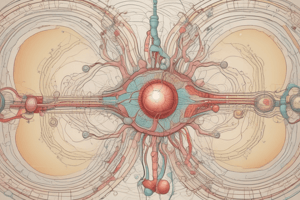Podcast
Questions and Answers
What is the primary function of cortisol in the body?
What is the primary function of cortisol in the body?
- To facilitate the synthesis of proteins
- To regulate circadian rhythm
- To stimulate the immune system
- To provide substrate for glucose synthesis through catabolism of lipids and proteins (correct)
What is the normal range of cortisol in plasma?
What is the normal range of cortisol in plasma?
- 5-25 µg/dl (correct)
- 25-50 µg/dl
- 1-5 µg/dl
- 50-100 µg/dl
What is the primary controller of cortisol secretion?
What is the primary controller of cortisol secretion?
- Adrenal gland
- Hypothalamus
- Thyroid gland
- Pituitary gland (correct)
What is the term used to describe excessive ACTH secretion by a pituitary tumor?
What is the term used to describe excessive ACTH secretion by a pituitary tumor?
What are the common symptoms of Cushing's syndrome?
What are the common symptoms of Cushing's syndrome?
What is the primary cause of Addison's disease?
What is the primary cause of Addison's disease?
What is the normal circadian rhythm of cortisol secretion?
What is the normal circadian rhythm of cortisol secretion?
What is the purpose of the Dexamethasone suppression test?
What is the purpose of the Dexamethasone suppression test?
What is the function of Cortisol in the body?
What is the function of Cortisol in the body?
Which layer of the adrenal cortex produces Cortisol?
Which layer of the adrenal cortex produces Cortisol?
What is the function of Aldosterone in the kidney?
What is the function of Aldosterone in the kidney?
What is the normal range of 24-hour urinary Aldosterone secretion?
What is the normal range of 24-hour urinary Aldosterone secretion?
What is the half-life period of Aldosterone?
What is the half-life period of Aldosterone?
What is the main regulator of Aldosterone secretion?
What is the main regulator of Aldosterone secretion?
What is the condition in which the adrenal gland releases too much of the hormone Aldosterone?
What is the condition in which the adrenal gland releases too much of the hormone Aldosterone?
How is Aldosterone carried in plasma?
How is Aldosterone carried in plasma?
What is the primary function of cortisol in the body?
What is the primary function of cortisol in the body?
What percentage of cortisol in plasma is bound to corticosteroid binding globulin (CBG)?
What percentage of cortisol in plasma is bound to corticosteroid binding globulin (CBG)?
What is the ratio of cortisol to corticosterol in the body?
What is the ratio of cortisol to corticosterol in the body?
What is the effect of cortisol on plasma glucose levels?
What is the effect of cortisol on plasma glucose levels?
What is the role of cortisol in the body?
What is the role of cortisol in the body?
What is the effect of cortisol deficiency on glucose levels?
What is the effect of cortisol deficiency on glucose levels?
What is the fate of cortisol in the plasma?
What is the fate of cortisol in the plasma?
What is the role of glucocorticoids in the body?
What is the role of glucocorticoids in the body?
Flashcards are hidden until you start studying
Study Notes
Adrenal Cortex Function and Disorder
Cortisol
- Cortisol is catabolized to provide substrates for glucose synthesis
- Cortisol secretion is controlled by ACTH from the pituitary and CRH from the hypothalamus
- Plasma cortisol levels range from 5-25µg/dl, with 20-100µg/24hrs urinary excretion
- Cortisol is metabolized mainly in the liver and secreted in the urine
Cushing's Syndrome
- Caused by excess cortisol production, often due to a pituitary tumor, adrenal tumor, or tumors elsewhere in the body
- Symptoms include weight gain, skin changes, easy bruising, excess hair growth, generalized weakness, and high blood pressure
- Cushing's disease refers specifically to excessive ACTH secretion by a pituitary tumor, which is relatively rare
Addison's Disease
- Caused by the failure to produce adequate cortisol levels, often due to autoimmune disorders, certain medications, sepsis, or bleeding into both adrenal glands
- Symptoms include weight loss, fatigue, low blood pressure, and electrolyte imbalances
Circadian Rhythm of Cortisol Secretion
- Cortisol levels peak between 7-9 am and are lowest between 4-11 pm
- Dexamethasone suppression test is used to diagnose suspected Cushing's syndrome
Adrenal Histology
- The adrenal gland is situated in the upper part of each kidney
- The adrenal cortex is formed of three layers: zona glomerulosa, zona reticular, and zona fasciculata
- Zona reticular and zona fasciculata produce cortisol, which regulates gluconeogenesis and has anti-inflammatory effects
- Zona glomerulosa produces aldosterone, which helps maintain water and salt balance in the body
Aldosterone
- Aldosterone is synthesized in the adrenal cortex, carries in plasma bound to albumin and corticosteroid binding globulin (CBG), and is metabolized in the liver
- Normal aldosterone secretion ranges from 2-26µg/24hrs
- Half-life of aldosterone is 20-30 minutes
Hyperaldosteronism (Conn's Syndrome)
- Primary hyperaldosteronism is a rare condition caused by a non-cancerous tumor of the adrenal gland (adenoma), adrenal hyperplasia, or glucocorticoid receptor defects
- Secondary hyperaldosteronism is often related to high blood pressure, cirrhosis of the liver, heart failure, and nephrotic syndrome
- Symptoms include fatigue, headache, high blood pressure, paralysis, muscle weakness, and numbness
- Laboratory findings include hypernatremia, hypokalemia, and metabolic alkalosis
Hypoaldosteronism
- Often occurs in Addison's disease due to destruction of the adrenal cortex by disease
- Can also occur isolated due to adrenal gland destruction, G-layer enzyme deficiencies, or mild renal insufficiency
- Symptoms include high serum potassium, low urinary potassium excretion (urine K < urine Na), and mild metabolic acidosis
Studying That Suits You
Use AI to generate personalized quizzes and flashcards to suit your learning preferences.



